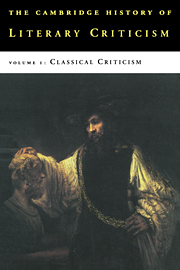Book contents
- Frontmatter
- 1 Early Greek views of poets and poetry
- 2 Language and meaning in archaic and classical Greece
- 3 Plato and poetry
- 4 Aristotle's poetics
- 5 The evolution of a theory of artistic prose
- 6 Hellenistic literary and philosophical scholarship
- 7 The growth of literature and criticism at Rome
- 8 Augustan Critics
- 9 Latin Criticism of the Early Empire
- 10 Greek Criticism of the Empire
- 11 Christianity and Criticism
- Bibliography
- Index
- References
4 - Aristotle's poetics
Published online by Cambridge University Press: 28 March 2008
- Frontmatter
- 1 Early Greek views of poets and poetry
- 2 Language and meaning in archaic and classical Greece
- 3 Plato and poetry
- 4 Aristotle's poetics
- 5 The evolution of a theory of artistic prose
- 6 Hellenistic literary and philosophical scholarship
- 7 The growth of literature and criticism at Rome
- 8 Augustan Critics
- 9 Latin Criticism of the Early Empire
- 10 Greek Criticism of the Empire
- 11 Christianity and Criticism
- Bibliography
- Index
- References
Summary
When, towards the end of the first century after Christ, the rhetorician Dio of Prusa called Aristotle the figure ‘from whom they say that criticism [kritike] and the study of language [Grammatikē] took their origin’ (53.1), it was not the Poetics which he, or those whose judgement he was citing, had in mind. Dio mentions in this context the ‘many dialogues’ in which Aristotle had discussed and praised the poems of Homer, and the phrase indicates that it was the work On Poets, among others, to which he was referring. The three books of On Poets, and the six or more books of Homeric Problems (presumably not in dialogue form), were in fact the two chief works in which Aristotle's ideas on poetry were disseminated in the ancient critical tradition; while the Poetics, originally produced for use within the philosophical school, never became at all readily available or widely known. Our own view of Aristotle the literary critic is therefore bound to differ substantially from that of antiquity; and it is the more inward voice of the philosophical theorist of poetry which the Poetics, if incompletely, allows us to hear. But it is a useful first step in a fresh approach to the surviving text to consider briefly what can still be discerned of its relation to the lost works on poetry which Aristotle intended for a more public audience.
- Type
- Chapter
- Information
- The Cambridge History of Literary Criticism , pp. 149 - 183Publisher: Cambridge University PressPrint publication year: 1990
References
- 7
- Cited by

